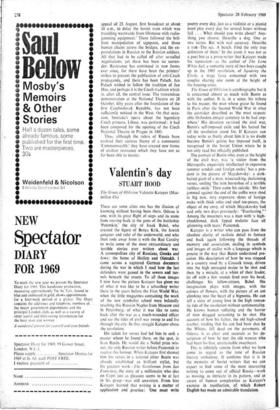Valentin's day
STUART HOOD
The Grass of Oblivion Valentin Katayev (Mac- millan 45s) There are some cities one has the illusion of knowing without having been there. Odessa is one, with its great flight of steps and its stone lions roaring back at the guns of the battleship `Potemkin,' the city of Isaak Babel, who created the figure of Benya Krik, the Jewish gangster and ruler of the underworld, and who then rode away from it with the Red Cavalry to write some of the most extraordinary and terrible stories ever written about war. A cosmopolitan city of Russians, Greeks and Jews: the home of Heifetz and Oistrakh. I came across a captured German document during the war in which I read how the last defenders were gassed in the sewers and tun- nels beneath the streets. To all these images I now have the picture Katayev has given me of what it was like to be a schoolboy writer there in the years before the First World War, when the little magazines containing the work of the new symbolist school were belatedly reaching this Russian Naples from Moscow and St Petersburg; of what it was like to come back after the war as a much-wounded officer and see the tides of civil war sweep to and fro through the city. In that struggle Katayev chose the revolution.
His talent for verses had led him to seek a master whom he found there, on the spot, in Ivan Bunin. He would die a Nobel prize win- ner, the only Russian writer before Pasternak to receive this honour. When Katayev first showed him his verses in a tattered jotter Bunin was already established as brilliant stylist, but his greatest work—The Gentleman from San Francisco, the story of a millionaire who dies on Capri just as pleasure seems to be at last in his grasp—was still unwritten. From him Katayev learned that writing is a matter of application and practice: 'One must write
poetry every day, just as a violinist or a pianist must play every day for several hours without fail . . . What should you write about? Any-
thing.. you choose. Describe a dog. One or two verses. But with real accuracy. Describe
a tree. The sea. A bench. Find the only true definition of them.' In the event it was not as a poet but as a prose-writer that Katayev made
his reputation—as the author of The Lone White Sail, a romantic story of two boys caught up in the 1905 revolution, of Squaring the Circle, a stage farce concerned with two couples sharing one room at the height of the housing crisis.
The Grass of Oblivion is autobiography but it is concerned almost as much with Bunin as
with the author. It is, in a sense, his tribute
to his master, the man whose grave he found in Paris after the Second World War in what the caretaker described as `the most respect- able Orthodox émigré cemetery to be had any- where.' His devotion survived the civil war,
Bunin's self-imposed exile and his hatred for all the revolution stood for. If Katayev can today write so freely about him it is no doubt because Bunin's genius has imposed itself, is recognised in the Soviet Union where he is not only read but officially published.
The portrait of Bunin who, even at the height of the civil war, was `a visitor from the Metropolis, exquisitely intellectual in expensive summer sandals and foreign socks,' has a pen- dant in the picture of Mayakovsky: a dark- haired giant of a man, wisecracking, declaiming verses, smiling `the iron horseshoe of a terrible ruthless smile.' Then came his suicide. His feet jammed against the end of the coffin were shod in big new, very expensive shoes of foreign make with thick soles and steel toe-pieces, the object of my envy, of which Mayakovsky had said only two days previously: "Everlasting." Among the mourners was a man with `a high- cheekboned, dark lipped mulatto face all glistening with tears.' Pasternak. , Katayev is a writer who can pass from the absolute clarity of realistic detail to fantasy and back again following the threads of memory and association, dealing in symbols and images of reality with a language which is
precise in the way that Bunin understood pre- cision. His description of how he was stopped in a country road by a Cossack troop, driven into the high unreaped maize to be shot and then, by a miracle, at a whim of their leader, let off with a few rounds fired over his head, challenges his fellow:citizen, Babel. His imagination plays with images, with the colours of flowers, with the picture of an ant climbing into the heart of a bignonia. He can tell a story of young love in the high roman- tic tide of the revolution without sentimentality. He knows human suffering and the horror
of men dragged screaming to be shot. His account of how his father, the old high-school
teacher, reading that his son had been shot by the Whites, fell dead on the pavements of Odessa, is as clear and accurate as his de- scription of how he met the old woman *114 had been his first, unattainable sweetheart.
This is infinitely remote from what we have come to regard as the tone of Russian literary orthodoxy. It confirms that it is in the memoirs of Soviet writers that we can expect to find some of the most interesting writing to come out of official Russia—work as moving, as intricate in its pattern, and as aware of human complexities as Katayev's exercise in recollection, of which Robert Daglish has made an admirable translation.


































 Previous page
Previous page